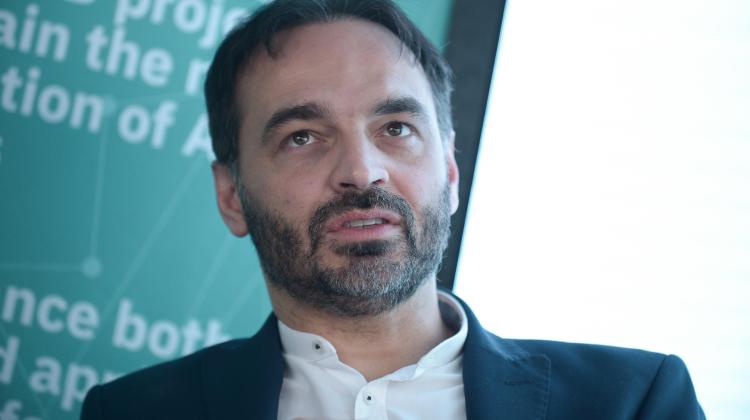Putting off, or never-ending duel in our brain
 Photo: Fotolia
Photo: Fotolia
Putting off things until later? It is the result of the struggle between the limbic system that is responsible for emotions, and the prefrontal cortex that allows to manage your objectives. The former often wins this duel, according to psychologist Magdalena Jagielska.
Procrastination is a tendency to postpone things that do not bring us immediate rewards and require effort. For some, such activity would be cleaning up the room, for others responding to a problematic e-mail or preparing a presentation for work. "We all procrastinate a bit. Paradoxically, this is quite a natural thing for our body and our physiology, because the performance of duties requires energy and the body likes to avoid unnecessary exertion" - told PAP Magdalena Jagielska, psychologist at the University of Warsaw.
Her words find confirmation in the results of the study on procrastination among Poles. It shows that more than 80 percent of us postpone some activities until later. Men do it more often (85 percent) than women (80 percent), and younger people procrastinate tasks more often than older persons. Procrastination occurs least frequently among people over the age of 60 (71 percent).
We clearly most often delay household tasks, primarily cleaning. Almost half of the respondents delay this activity. In the following places are ironing, cooking and washing. Next on the list are professional tasks, which 15.2 percent respondents delay, office and official functions (11.3 percent), personal tasks such as starting a diet, quitting an addiction and decision of marriage (10.3 percent), as well as minor repairs or renovations (10.3 percent) and school matters (9.3 percent).
"Seemingly putting off tasks until later is an irrational action, which in the future could cause us a lot of damage. But man is not a rational economist who weighs what is good and what is bad for him. Procrastination reflects the rivalry between our limbic system and prefrontal cortex. The former controls emotions and is responsible for impulsiveness, desire for immediate reward and improving bad moods. The prefrontal cortex is responsible for concentration, self-management, management of attention and objectives, understanding of the concept of time, etc. Listening to reason when you can succumb to emotions and temptations is simply more difficult" - describes the psychologist.
This is when - with prefrontal cortex defeated by the limbic system - we put off until later those things that will not bring us immediate pleasure, induce fear or allow us to avoid future suffering. "When you prepare a presentation that costs a lot of effort and stress, it is a natural mechanism to instantly want to improve a bad mood. What\'s best to improve it? Facebook, refrigerator, calling a friend. These are usually the things - bringing fast reward - we do when we procrastinate" - said Jagielska.
The reward for performing difficult tasks that we only get in the future, has a different effect. There is no immediate emotional charge to motivate us and we have to achieve the motivation ourselves: force ourselves to do something, understand why it makes sense. Act rationally and hope that positive emotions and satisfaction of doing something difficult will also come.
It turns out that we inherited the mechanism of engaging in activities that bring immediate reward from our ancestors. For them, putting off things until later did not really pay off, and getting immediate reward could be a matter of life and death. "Let us consider the time what a man >>came down from the tree<<. The horizon of time was much shorter then, and our ancestors were facing many dangers. Perhaps collecting food for the winter was motivating for them, but postponing a reward available at the time until unspecified later did not make sense, because the opportunity could never repeat itself. It was very probable that our ancestor would not live to see this >>payday<<. So it was more important to get the reward here and now" - the researcher explained.
Procrastination can sometimes be a very reasonable solution for us too, because it helps to make a list of priorities. "It can be a way to separate the things that are really important for us, that we impose on ourselves, assuming that we have endless energy and time" - she said.
The problem can occur, however, if we have a tendency to ignore the future not in the context of a dripping faucet or unwashed windows, but in the context of aging, deteriorating health, risk of unemployment, low retirement. "The future comes surprisingly quickly. It may turn out that although we once led a charmed life, at the age of 60 or 70 we do not have the resources, health, energy and support. That is why you should think about your future now, for example by trying to make at least small savings" - emphasised the psychologist.
What to do to slightly improve your motivation and more conscientiously approach domestic and professional responsibilities? Magdalena Jagielska advised that it is good to simply think about what causes discomfort and learn to manage your own mood. "Start with diet and body, organize you health. This is a starting point. It is also worth to remember about physical activity so that endorphins have a chance to be produced" - said the psychologist.
A mental exercise could also help: imagine what your future will look like, if you perform certain task and if you do not. This way - when you see what you can lose by such behaviour - you can scare yourself a little. For some people punishment is a stronger motivation than reward, and the pressure and risk of loss can motivate to action.
"Besides, if you have something complicated and requiring a lot of work to do, it is good to divide it into small pieces. When you want to run a marathon, thinking about the whole distance would be very demotivating. You need to think about small sections. Once you make the first step, and then another, instead of a negative loop a positive reinforcement loop engages: I managed to do something, I want more" - she emphasised.
The study "What we put off until later" was carried out in January 2016 by means of telephone interviews (CATI) on a random sample of 500 people. The study was prepared by ECDF Research for the brand e-pity.
PAP - Science and Scholarship in Poland, Ewelina Krajczyńska
ekr/ mrt/
tr. RL
Przed dodaniem komentarza prosimy o zapoznanie z Regulaminem forum serwisu Nauka w Polsce.


















